State Budget: Governor Crist Orders 15 Percent Hold Back of Budgeted General Revenue Funds as Agencies Prepare for Deeper Cuts
On March 19, 2009, Governor Charlie Crist ordered state agencies to hold back 15 percent of their appropriated general revenue funds for the remainder of the current fiscal year, which ends on June 30, 2009. In a memorandum to state agencies, Jerry L. McDaniel, Director of the Office of Policy and Budget, announced that for the fourth quarter of the 2008 – 2009 fiscal year, the state would release only 85 percent of funding appropriated from the state General Revenue Fund. The hold-back is estimated to affect approximately $800 million of appropriated funds.
The memorandum described the action as a “precautionary action” that “will allow us to continue managing cash flow effectively and monitor the revenue collections in the upcoming months.” The Office of Policy and Budget also noted that additional funds might be released as the state begins to receive federal economic stimulus funding.
As agencies prepared to adjust to reduced funding in the fourth quarter of the current fiscal year, they also responded to a Senate Committee on Ways and Means “exercise” in which the agencies were asked to describe how they would respond to budget cuts in the 10- to 20-percent range for fiscal year 2009 – 2010. In general, agencies testified that budget cuts of that magnitude would require cuts in programs. Some of the potential service cuts presented to the Senate committee included:
- Elimination of home services for 5,000 frail elderly clients of the Florida Department of Elder Affairs and caps or elimination of home care services for 328 severely disabled clients of the Agency for Persons with Disabilities
- Personnel reductions at the Department of Highway Safety and Motor Vehicles, including 70 highway patrol troopers and 290 others
- Elimination of nearly 15,000 children from school-readiness programs
- Increased admission fees and other fees at state parks
- Early release of prison inmates or closing of some prisons
Population: U.S. Census Bureau Reports That Florida’s Population Growth Slowed to 0.7 Percent Between 2007 and 2008
In official population estimates released on March 19, 2009, the U.S. Census Bureau reported that Florida’s population grew by 0.7 percent between July 1, 2007 and July 1, 2008, dropping to the lowest levels in more than 60 years. According to a Census Bureau spokesperson, births and immigration accounted for the statewide population gain of 128,814 persons while, “for the first time in quite a while,” the number of people leaving Florida exceeded the number of people moving to Florida. As of July 1, 2008, Florida’s population was estimated to be 18,328,340.
Of Florida’s 10 largest counties, eight recorded population gains between zero and 0.9 percent. Of the largest counties, only Polk County, the ninth largest, reflected a population increase of more than one percent. Polk County’s population grew by 7,627 persons or 1.3 percent. Pinellas County was the only top 10 county to show a population loss, losing 4,184 persons or 0.5 percent. Pinellas County reflected the largest population loss in absolute numbers. As a percentage, Charlotte County’s loss of 1.6 percent (2,419 persons) was the state’s largest population loss.
An analysis from the Bureau of Economic and Business Research at the University of Florida (Bureau) estimated that population growth could be as low as 37,000 persons a year during 2008 – 2010. According to the Bureau, 14 counties (Broward, Calhoun, Collier, Gulf, Lee, Martin, Monroe, Okaloosa, Palm Beach, Pasco, Pinellas, Putnam, Seminole, and Volusia) are expected to lose population during the next two years.
Seminole Indian Gaming Compact: Florida House, Senate Proposals Expected to Address Competitive Balance Between Casinos and Pari-Mutuels
Legislative committees are preparing to address the future of gaming at existing pari-mutuel facilities and at casinos operated by the Seminole Tribe of Florida. According to press reports, both the House and the Senate will be attempting to address a perceived competitive imbalance between the Seminole casinos, which are the only facilities in Florida to offer blackjack and pari-mutuel facilities, which are authorized to operate slot machines in Miami-Dade and Broward counties.
According to published reports, the House will propose a new gaming compact that would allow the tribe to operate slot machines, but not blackjack. The authority to operate slot machines would be exclusive except in Miami-Dade and Broward counties. Media reports indicate that Senate leadership may prefer an approach that would allow blackjack at the Seminole casinos, but also would expand the offerings at pari-mutuel facilities. Changes in the rates of tax paid by pari-mutuels also are being considered.
Environment: Declining Property Values Could Threaten State Acquisition of U.S. Sugar Corporation Land
The state’s Consensus Revenue Estimating Conference predication that property values will decline by a statewide average of 12 percent during the 2009 – 2010 fiscal year raises new questions on the South Florida Water Management District’s (District) ability to conclude its $1.34 billion acquisition of more than 180,000 acres of Everglades land from the U.S. Sugar Corporation (U.S. Sugar). The agreement between the district and U.S. Sugar allows the District to withdraw from the transaction if the cost imperils the District’s ability to carry out its “core” functions. District staff has reported that financing the acquisition would require annual debt service of $109 million, which would require the District to cut its operating budget by as much as 25 percent. The District’s governing board will analyze potential budget cuts in June 2009. The transaction must close no later than September 25, 2009.
Public Affairs News Alert is part of our ongoing commitment to providing up-to-the-minute information about pressing concerns or industry issues affecting our clients and our colleagues. If you have any questions about this alert or would like to discuss these topics further, please contact your Foley attorney or any of the following individuals:
|
Marnie George Michael P. Harrell Robert H. Hosay |
Jonathan P. Kilman Thomas J. Maida Leonard E. Schulte |

